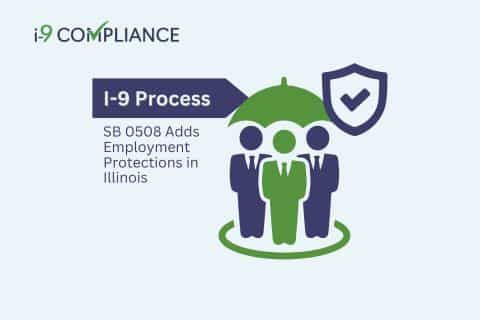SB 0508 Adds Employment Protections in Illinois I-9 Process

Illinois’ Governor JB Pritzker recently signed a bill (SB 0508) that adds new employment protections. These protections affect anyone flagged by employment eligibility verification (Form I-9) systems, such as the federal government’s E-Verify system. According to the bill, employers must abide by a new process when systems flag discrepancies in employees’ I-9 documentation. SB 0508 will take effect on January 1, 2025.
Federal law requires employers to verify the work authorization of newly hired individuals through From I-9. In some cases, such as federal contractors, employers must also process these new hires through the E-Verify system. E-Verify compares the information submitted on the individual’s Form I-9 to records maintained by the Department of Homeland Security and Social Security Administration. The federal government intends to guarantee an employee’s authorization to work in the U.S. quickly and easily through this system.
In most cases, the process finishes with no issues within minutes. However, discrepancies can occur between the information entered into the system and stored in the federal government’s databases. When the system encounters these discrepancies, employers will receive notice from the government of the so-called “no match.” Employers and workers must correct the issue when this happens.
Nevertheless, the sponsors of SB 0508 have claimed that this does not always happen. Instead, some employers may choose to terminate an individual’s employment. SB 0508 would address this practice of dismissing individuals without giving them a chance to correct the issues. One way is by protecting employees from adverse employment-related actions before they can address the discrepancies.
For example, SB 0508 requires employers to inform employees of any discrepancies and give them time to make corrections. Employers must also notify the employee of the timeline for correcting the information, explain the discrepancy, and their right to have a representative of their choosing present in any meetings with the employer.
Furthermore, employers must notify employees of any upcoming inspections by federal entities within five business days of receiving the inspection notice. Examples of such inspections include those from the U.S. Immigration and Customs Enforcement (ICE). Employers also owe employees notifications of the inspection results and a chance for them to correct any discrepancies within a designated time frame.
These changes will require employers to make changes to ensure compliance when the law goes into effect on January 1, 2025. Ensuring compliance with employment eligibility verification can prove challenging, especially with the constant changes to the I-9 process. However, employers must stay updated and ensure compliance. One way to succeed is by incorporating an electronic Form I-9 management tool into the hiring process. This tool can provide step-by-step guidance through the verification process and easy-to-use electronic storage for forms and documentation.
Automate your employment eligibility verification today with the ensured compliance of I-9 Compliance.